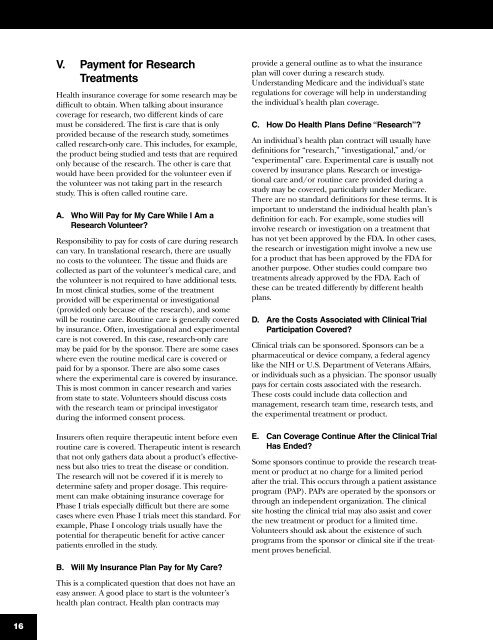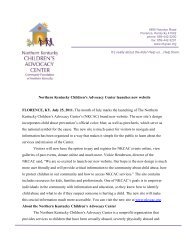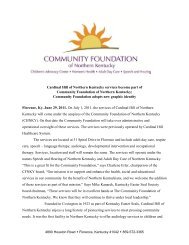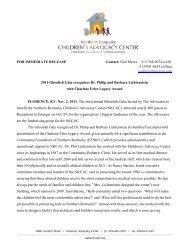Medical Research: A Consumer's Guide for Participation
Medical Research: A Consumer's Guide for Participation
Medical Research: A Consumer's Guide for Participation
Create successful ePaper yourself
Turn your PDF publications into a flip-book with our unique Google optimized e-Paper software.
V. Payment <strong>for</strong> <strong>Research</strong><br />
Treatments<br />
Health insurance coverage <strong>for</strong> some research may be<br />
difficult to obtain. When talking about insurance<br />
coverage <strong>for</strong> research, two different kinds of care<br />
must be considered. The first is care that is only<br />
provided because of the research study, sometimes<br />
called research-only care. This includes, <strong>for</strong> example,<br />
the product being studied and tests that are required<br />
only because of the research. The other is care that<br />
would have been provided <strong>for</strong> the volunteer even if<br />
the volunteer was not taking part in the research<br />
study. This is often called routine care.<br />
A. Who Will Pay <strong>for</strong> My Care While I Am a<br />
<strong>Research</strong> Volunteer?<br />
Responsibility to pay <strong>for</strong> costs of care during research<br />
can vary. In translational research, there are usually<br />
no costs to the volunteer. The tissue and fluids are<br />
collected as part of the volunteer’s medical care, and<br />
the volunteer is not required to have additional tests.<br />
In most clinical studies, some of the treatment<br />
provided will be experimental or investigational<br />
(provided only because of the research), and some<br />
will be routine care. Routine care is generally covered<br />
by insurance. Often, investigational and experimental<br />
care is not covered. In this case, research-only care<br />
may be paid <strong>for</strong> by the sponsor. There are some cases<br />
where even the routine medical care is covered or<br />
paid <strong>for</strong> by a sponsor. There are also some cases<br />
where the experimental care is covered by insurance.<br />
This is most common in cancer research and varies<br />
from state to state. Volunteers should discuss costs<br />
with the research team or principal investigator<br />
during the in<strong>for</strong>med consent process.<br />
Insurers often require therapeutic intent be<strong>for</strong>e even<br />
routine care is covered. Therapeutic intent is research<br />
that not only gathers data about a product’s effectiveness<br />
but also tries to treat the disease or condition.<br />
The research will not be covered if it is merely to<br />
determine safety and proper dosage. This requirement<br />
can make obtaining insurance coverage <strong>for</strong><br />
Phase I trials especially difficult but there are some<br />
cases where even Phase I trials meet this standard. For<br />
example, Phase I oncology trials usually have the<br />
potential <strong>for</strong> therapeutic benefit <strong>for</strong> active cancer<br />
patients enrolled in the study.<br />
provide a general outline as to what the insurance<br />
plan will cover during a research study.<br />
Understanding Medicare and the individual’s state<br />
regulations <strong>for</strong> coverage will help in understanding<br />
the individual’s health plan coverage.<br />
C. How Do Health Plans Define “<strong>Research</strong>”?<br />
An individual’s health plan contract will usually have<br />
definitions <strong>for</strong> “research,” “investigational,” and/or<br />
“experimental” care. Experimental care is usually not<br />
covered by insurance plans. <strong>Research</strong> or investigational<br />
care and/or routine care provided during a<br />
study may be covered, particularly under Medicare.<br />
There are no standard definitions <strong>for</strong> these terms. It is<br />
important to understand the individual health plan’s<br />
definition <strong>for</strong> each. For example, some studies will<br />
involve research or investigation on a treatment that<br />
has not yet been approved by the FDA. In other cases,<br />
the research or investigation might involve a new use<br />
<strong>for</strong> a product that has been approved by the FDA <strong>for</strong><br />
another purpose. Other studies could compare two<br />
treatments already approved by the FDA. Each of<br />
these can be treated differently by different health<br />
plans.<br />
D. Are the Costs Associated with Clinical Trial<br />
<strong>Participation</strong> Covered?<br />
Clinical trials can be sponsored. Sponsors can be a<br />
pharmaceutical or device company, a federal agency<br />
like the NIH or U.S. Department of Veterans Affairs,<br />
or individuals such as a physician. The sponsor usually<br />
pays <strong>for</strong> certain costs associated with the research.<br />
These costs could include data collection and<br />
management, research team time, research tests, and<br />
the experimental treatment or product.<br />
E. Can Coverage Continue After the Clinical Trial<br />
Has Ended?<br />
Some sponsors continue to provide the research treatment<br />
or product at no charge <strong>for</strong> a limited period<br />
after the trial. This occurs through a patient assistance<br />
program (PAP). PAPs are operated by the sponsors or<br />
through an independent organization. The clinical<br />
site hosting the clinical trial may also assist and cover<br />
the new treatment or product <strong>for</strong> a limited time.<br />
Volunteers should ask about the existence of such<br />
programs from the sponsor or clinical site if the treatment<br />
proves beneficial.<br />
B. Will My Insurance Plan Pay <strong>for</strong> My Care?<br />
This is a complicated question that does not have an<br />
easy answer. A good place to start is the volunteer’s<br />
health plan contract. Health plan contracts may<br />
16
















